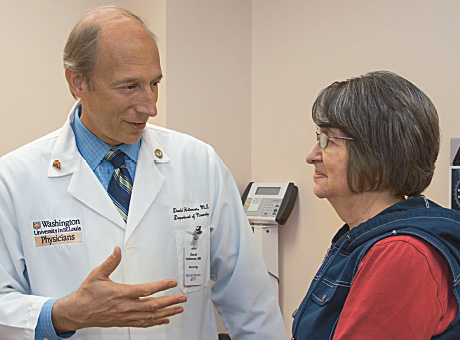
David M. Holtzman, MD, with patient Lynn Burlingame in the Charles F. and Joanne Knight Alzheimer’s Disease Research Center.

David M. Holtzman, MD, with patient Lynn Burlingame in the Charles F. and Joanne Knight Alzheimer’s Disease Research Center.
The first worldwide human testing of three investigational drugs to determine if they can prevent Alzheimer’s disease dementia is being led by researchers at Washington University.
The trial involves 240 people, all from families with rare inherited genetic mutations. Those who inherit the mutation are certain to develop Alzheimer’s. The academic medical centers involved with the trial are connected through an international research study, the Dominantly Inherited Alzheimer Network (DIAN), led by John C. Morris, MD, the Harvey A. and Dorismae Hacker Friedman Professor of Neurology and director of the Charles F. and Joanne Knight Alzheimer’s Disease Research Center.
“As more and more baby boomers move into this age of 65 and older, we’ll see an explosion of people with Alzheimer’s disease and dementia,” says Morris, calling it a public health disorder of epidemic proportions.
“We want to prevent damage and loss of brain cells by intervening early in the disease process — even before outward symptoms are evident,” says Randall J. Bateman, MD, the Charles F. and Joanne Knight Distinguished Professor of Neurology and principal investigator of the grant and director of DIAN.
“We want to prevent damage and loss of brain cells by intervening early in the disease process — even before outward symptoms are evident.”
— RANDALL J. BATEMAN, MD
Washington University has been leading the field of Alzheimer’s disease research for more than 20 years. It is here that scientists discovered that degenerative changes in the brain begin 15 years before signs of dementia become apparent.
”There are an estimated 5.5 million people with dementia due to Alzheimer’s right now,” says David M. Holtzman, MD, the Andrew B. and Gretchen P. Jones Professor and chair of the Department of Neurology, “and that number is expected to triple by 2055.”
Basic research has shown that the build-up of two proteins in the brain, one somehow triggering the accumulation of the other, occurs in patients with Alzheimer’s. Holtzman’s lab and others are working to find ways to decrease the build-up of both of the proteins. An added hope is that a fast, reliable measure, such as a blood test, will allow diagnosis of Alzheimer’s disease early enough so that new medications can stop the accumulation of proteins and thus prevent brain degeneration.
“We hope these new drugs not only hit the target protein but also slow the process of degeneration,” Holtzman says. “Because of research now underway, there is definite hope that at some point we will be able to prevent this disease.”